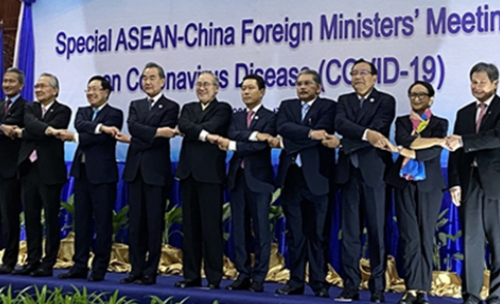US whines as China charts new SE Asia course
By Li Kaisheng Source: Global Times Published: 2020/10/11 18:58:40

Chinese State Councilor and Foreign Minister Wang Yi (sixth from the left), foreign ministers from 10 ASEAN member states and ASEAN Secretary-General Lim Jock Hoi (right) join hands on stage at a foreign ministers' meeting between China and ASEAN on the COVID-19 in Vientiane, Laos, on February 20, 2020. Photo: AFP
Chinese State Councilor and Foreign Minister Wang Yi is scheduled to pay official visits to Cambodia, Malaysia, Laos and Thailand, and a transit stop in Singapore from Sunday to Thursday. Over the just passed Friday and Saturday, at the invitation of Wang, Indonesian President's Special Envoy, Coordinator for Cooperation with China and Coordinating Minister Luhut Binsar Pandjaitan, and Philippine Foreign Affairs Secretary Teodoro L. Locsin Jr., both visited China.
Wang's communication with the seven Southeast Asian countries can be seen as an important step for China's Southeast Asian policy against the backdrop of complicated international situations - especially the continued spread of the deadly novel coronavirus.
It will help China and Southeast Asian countries discuss key issues facing regional economic recovery and stabilize regional production and supply chains. It will be conductive for China and Southeast Asian countries to consolidate their strategic consensus - carrying forward negotiations on the Code of Conduct in the South China Sea, as well as the Regional Comprehensive Economic Partnership.
In recent months, China and Southeast Asian countries have conducted important exchanges. Chinese State Councilor and Defense Minister Wei Fenghe paid visits to four ASEAN member states between September 7 and 11. Yang Jiechi, a member of the Political Bureau of the Central Committee of the Communist Party of China, visited Singapore in August.
Southeast Asia has always been of strategic significance to China. By contrast, the US has seen the region as an important anchor to strategically and tactically put China in check. Where there is suppression, there are countermeasures. From this point of view, Beijing's strengthening ties with Southeast Asia is related to Washington's containment policies against China.
However, two points should be stressed. First, relations between China and Southeast Asia stem from their own basis and logic. This means that China needs to promote relations regardless of whether the US disturbs matters or not. Second, that China develops ties with Southeast Asia does not aim to push the US out of the region. China instead seeks to stop US attempts to contain China regionally. The regular relationship between the US and Southeast Asian countries is not even a question. The crucial problem is: the US should never disturb China to develop regular relations with Southeast Asian countries.
The US has been hyping up issues: such as water sources in the Lancang-Mekong region. This is baseless, scientifically incorrect and hegemonic. Washington launched the Mekong-US Partnership on September 11, 2020 and US media said this will give the US more clout in the five lower Mekong countries, namely Cambodia, Laos, Myanmar, Thailand and Vietnam.
Washington has always been trying to get involved more in Mekong affairs. In 2009, then US secretary of state Hillary Clinton introduced the Lower Mekong Initiative. There is no problem with US developing good ties with countries around the Mekong River Basin. But the problem is that the US has attempted to drive a wedge between China and these countries on issues such as water resources, and hyped the so-called China threat theory.
This will naturally be resisted. Foreign Minister Wang Yi will visit Cambodia, Laos and Thailand, which will help these countries have a better understanding of China. He will also help them formulate an objective stance on China-US relations and Mekong affairs.
The State of Southeast Asia: 2020 Survey Report, published in January by the ASEAN Studies Centre at ISEAS-Yosof Ishak Institute based in Singapore, revealed that over half of the Southeast Asian respondents (52.2 percent) view China as the most influential power in strategic regional politics. Among these respondents, 85.4 percent registered their concerns and worries over China's political and strategic impact.
The "concerns" and "worries" are not necessarily hostile. Much of them are due to the public's lack of knowledge over China's political development and foreign policy. They believe a powerful country is bound to seek hegemony, and mistakenly assume China will move toward greater geopolitical and economic expansion. China should continue to open its door and enable the public of Southeast Asia to have a whole and objective picture of China. The public's unbiased understanding of China will help cooperation between China and ASEAN go more smoothly.
The author is a research fellow and deputy director at the Institute of International Relations of the Shanghai Academy of Social Sciences. opinion@globaltimes.com.cn
RELATED ARTICLES:
Posted in: VIEWPOINT